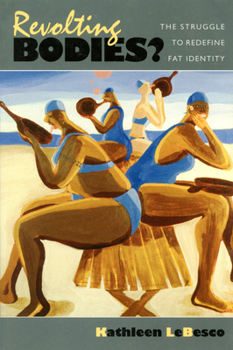Revolting Bodies?: The Struggle to Redefine Fat Identity
Select Format
Select Condition 
Book Overview
Viewed as both unhealthy and unattractive, fat people are widely represented in popular culture and in interpersonal interactions as revolting--as agents of abhorrence and disgust. Yet if we think about "revolting" in a different way, Kathleen LeBesco argues, we can recognize fatness as not simply an aesthetic state or a medical condition, but a political one. If we think of revolting in terms of overthrowing authority, rebelling, protesting, and rejecting, then corpulence carries a whole new weight as a subversive cultural practice that calls into question received notions about health, beauty, and nature. Revolting Bodies examines a number of sites of struggle over the cultural meaning of fatness. The book is grounded in scholarship on identity politics, the social construction of beauty, and the subversion of hegemonic medical ideas about the dangers of fatness. It explains how the redefinition of fat identities has been undertaken by people who challenge conventional understandings of nature, health, and beauty and, in so doing, alter their individual and collective relationships to power. LeBesco explores how the bearer of a fat body is marked as a failed citizen, inasmuch as her powers as a worker, shopper, and sexually "desirable" subject are called into question. At the same time, she highlights fat fashion, relations among fat, queer, and disability politics and activism, and online communities as opportunities for transforming these pejorative stereotypes of fatness. Her discussion of the long-term ramifications of denying bodily agency--in effect, letting biological determinism run rampant--has implications not only for our understanding of fatness but also for future political practice.
Format:Paperback
Language:English
ISBN:1558494294
ISBN13:9781558494299
Release Date:December 2003
Publisher:University of Massachusetts Press
Length:162 Pages
Weight:0.62 lbs.
Dimensions:0.5" x 6.0" x 8.8"
Grade Range:Postsecondary and higher
Customer Reviews
3 ratings
A Serious Look at Our Society and Being Fat
Published by Thriftbooks.com User , 18 years ago
I found Revolting Bodies a difficult read. It doesn't have the light flair of Fat!So? or the humour of The Fat Girl's Guide to Life. It isn't full of funny cartoons are interesting sidebars. It is a serious look into the history and politics surrounding fat and the people attached to it. Through a series of chapters which read like short essays, LeBesco delves into the world of fat from a different perspective. In the intro LeBesco states being fat goes beyond the physical and medical state and looks at it as a "political situation". The eight chapter titles are as follows: * Organization and Embodiment: Politicizing and Historicizing Fatness * Antidotes to Medical Discourse about Fatness * Sexy/Beautiful/Fat * Citizen Profane: Consumerism, Class, Race, and Body * Revolution on a Rack: Fatness, Fashion, and Commodification * Framing Fatness: Popular Representation of Obesity as Disability * The Queerness of Fat * The Resignification of Fat in Cyberspace * Fat Politics and the Will to Innocence Organization and Embodiment, discusses the portrayal of plush women in Hellenistic and Greek art as it strived to depict the normal as the ideal and beautiful. It goes on to discuss past cultures and the influence of food to maintain body stature and appearance. I always wondered how being fat became the "dirty" word. It was very interesting to see how the scale could have easily been tipped the other way and thin could have been ruled as "dirty" and unfavourable were it not for the political and religious directioning. An important point would definitely be how fat people are pigeon holed into a few mind sets leaving many left out because they don't fall into the predefined categories. Antidotes to Medical Discourse, was a better chapter for me. I was able to get into the writer's vocabulary and not feel left out in the cold by her dialogue. In this chapter she discusses measures like health threats, food labelling and drug treatments being used by the government and the individual to curb obesity. She goes on to mention, briefly, the language of fat. Well worth reading. Citizen Profane, asks what beauty means to the general population and where does the fat individual fit in? A very interesting tidbit from this chapter was the link between "fat oppression and capitalist culture" and the unlikelihood of it going away. Fat people don't conform to the ideal culture which promotes diets and fitness products so they're punished for going against the ideal. She touches on the confusion between obesity, poverty, socializing with other minority groups and ignorance. Overall, the text is dry and hard to get through. And I went through many passages without having a clue what I was reading about before I hit a nugget that hit home for me. This book isn't for the faintly educated but if you want to move beyond the usual cutesy books normally thrown at us I recommend this one. You will definitely learn something new about our society and culture and the ins a
Satisfying
Published by Thriftbooks.com User , 18 years ago
Some say this slender volume provides thin gruel for the overweight, but those nay-sayers can stuff it. There's plenty of food for thought here, and I for one will no longer regurgitate my stale notions of fat identity.
How fat creates oppression and stereotypes
Published by Thriftbooks.com User , 20 years ago
Fat people are widely represented in popular culture as being revolting: as agents of disgust yet Kathleen LeBesco argues in Revolting Bodies?: The Struggle To Redefine Fat Identity that fatness is more than a health or aesthetic issue: it is also a political issue. Revolting Bodies? informatively and thoughtfully considers sites of struggle over the cultural meaning of fatness and will have a special appeal to college-level health students as well as the health and fitness community with respect to its analysis of how fat creates oppression and stereotypes.






